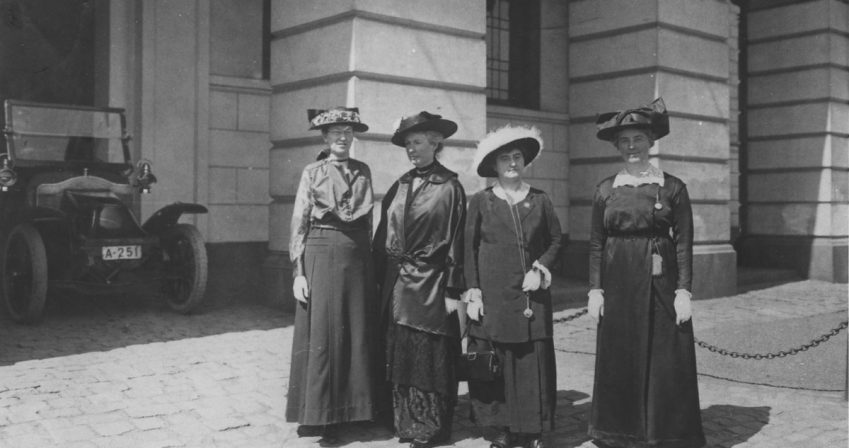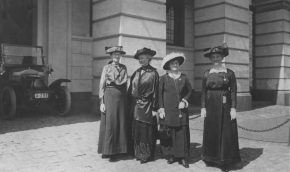A remarkable pacifist, barrister and feminist
Women in Law
- Introduction
- Timeline
- Joyce Bamford-Addo
- Marion Billson
- Jill Black
- Elizabeth Butler-Sloss
- Sue Carr
- Eugenia Charles
- Lynda Clark
- Freda Corbet
- Coomee Rustom Dantra
- Leeona Dorrian
- Heather Hallett
- Frene Ginwala
- Rosalyn Higgins
- Daw Phar Hmee
- Lim Beng Hong
- Dorothy Knight Dix
- Sara Lawson
- Elizabeth Lane
- Theodora Llewelyn Davies
- Gladys Ramsarran
- Lucy See
- Evelyn Sharp
- Victoria Sharp
- Ingrid Simler
- Teo Soon Kim
- Ivy Williams
- The Significance of the Sex Disqualification (Removal) Act 1919
- Podcasts
Home › Women in Law › Pioneering Women in Law › Chrystal Macmillan
Chrystal Macmillan
Middle Temple
Born in 1872, the only daughter of an Edinburgh tea merchant, Chrystal Macmillan was called to the Bar of Middle Temple in 1924 and became one of the first female barristers in this country. A dedicated campaigner for women’s suffrage across the world, she pursued exclusively legal and non-violent means to achieve her political goals in peacetime and in wartime. Her friend and fellow suffragist Cicely Hamilton said of her that:
she was the right kind of lawyer, one who held that Law should be synonymous with Justice. Her chief aim in life – one might call it her passion – was to give every woman of every class and nation the essential protection of justice. She was herself a great and very just human being. She could not budge an inch on matters of principle but she never lost her temper and never bore a grudge in defeat.
Her first battle for justice came whilst working at the Scottish Federation of Women’s Suffrage. As the first female Science graduate of Edinburgh University, she was an ideal choice to become secretary of the Women Graduates of the Scottish Universities. She brought an action seeking to establish the right of women to vote on the University General Councils. The case made history as Macmillan became the first woman ever to argue a case before the House of Lords. (Nairn v University Courts of St Andrews and Edinburgh [1909 AC147]). The Glasgow Herald reported her debut as follows:
Dressed …. in a dark red costume and hat with ermine furs, [she] spoke for three hours with complete self-possession and great skill in exposition. [1]
She was also hailed as a modern Portia but, unlike the Shakespearean original, she failed to persuade the bench. She appeared as a litigant in person, with her advocacy skills singled out by their Lordships, who cryptically conceded that “this appeal has been argued temperately” and predictably lost her case, with the Lords holding that women graduates were not ‘persons’. Had they been ‘persons’, their Lordships went on to find, women graduates would have been legally incapable:
“I can then entertain no doubt that when examined ‘persons’ means male person in the Act,” said Lord Ashbourne in the judgment. The Lord Chancellor held, “If the word ‘persons’… is wide enough to comprise women, then they are shut out by the exception of those subject to a legal capacity.”
Following this case, Macmillan moved to London where she was elected to the executive of the National Union of Women’s Suffrage Societies. In 1913 she became Secretary of the International Women’s Suffrage Alliance and held the post until 1920.
War broke out in 1914 and Macmillan resigned on principle from the National Union of Women’s Suffrage Societies, which took a pro-war stance. Macmillan plunged into the humanitarian work of relieving the sufferings caused by the War. She was on the first boat that crossed the North Sea to take a food convoy to Flushing after the fall of Antwerp.


Chrystal Macmillan, featured on the right of the photograph, is one of the founders of WILPF. In this image Macmillian is on a peace mission to the King of Norway in 1915, she was also the first woman to plead a case before the House of Lords when she argued for her right to vote in 1908. Source: https://www.flickr.com/photos/lselibrary/12496886113/
Then she played a leading role in organising an International Congress of Women at The Hague in 1915 which sought to bring peace by enlisting the aid of neutral states. Twelve national deputations sent a total of over 1100 women to seek a peaceful end to the war. Britain planned to send 180 women yet only two of these managed to cross the Channel. The First Lord of the Admiralty, Winston Churchill, had closed the North Sea to all shipping and cancelled the ferry service. But he couldn’t cancel the conference. Nor could he thwart Macmillan’s travel plans. She was already in Antwerp and had no difficulty reaching the Hague.
Delegates were asked to endorse two principles:
that international disputes should be settled by pacific means and that the Parliamentary franchise should be extended to women.
In all, twenty resolutions were passed under the following headings: Women and the Peace Settlement Conference, Action Toward Peace, Principles of Permanent Peace, International Cooperation, the Education of Children and Action to be taken. They defined the principles of permanent peace and proposed the formation of a Society of Nations supported by a permanent International Court of Justice. These innovations later developed into the League of Nations and, after World War II, the United Nations itself.
Respect for Nationality
The International Congress of Women recognising the right of the people to self-government affirms that there should be no transference of territory without the consent of the men and women residing therein, and urges that autonomy and a democratic parliament should not be refused to any people. Arbitration and Conciliation
This International Congress of Women, believing that war is the negation of progress and civilisation, urges the Governments of all nations to come to an agreement to refer future international disputes to arbitration and conciliation.
International Pressure
This International Congress of Women urges the Governments of all nations to come to an agreement to unite in bringing social, moral and economic pressure to bear upon any country which resorts to arms instead of referring its case to arbitration or conciliation.
Democratic Control of Foreign Policy
Since war is commonly brought about not by the mass of people, who do not desire it, but by groups representing particular interests, this International Congress of Women urges that Foreign Politics shall be subject to Democratic Control; and declares that it can only recognise as democratic a system which includes the equal representation of men and women.
The Enfranchisement of Women
Since the combined influence of the women of all countries is one of the strongest forces for the prevention of war, and since women can only have full responsibility and effective influence when they have equal political rights with men, this International Congress of Women demands their political enfranchisement.
Macmillan was asked to join an all-female group that presented the peace proposals to the heads of neutral states in the hope of halting the First World War. She visited America to meet President Wilson, who echoed nine of the women’s proposals in his famous Fourteen Points.
After the war, the women held a second International Congress in Zurich in May 1919. With wisdom and foresight, they issued a strong condemnation of the harsh terms that were being planned for Germany by the Treaty of Versailles which was to be signed in the following month. Regrettably, their concerns were ignored by the men in power, and so the scene was set for the Second World War.
Once she was called to the Bar in 1924, Macmillan joined the Western Circuit and became only the second woman to be elected to its Bar mess. She co-founded the Open Door Council, which pressed for equal economic opportunities for women, and for the removal of ‘protective legislation’ which prevented women from entering better paid manual jobs such as mining. She remained President of the Open Door Council until her death.
She stood as the Liberal Candidate from Edinburgh in 1935 but failed to gain the seat.
She died aged 65 in 1937 and left legacies to the Open Door Council and to the Association or Moral and Social Hygiene, with which she had worked to combat the trafficking of female sex workers.
Edinburgh University honours her memory through the Chrystal Macmillan Building in the School of Social and Political Studies. A millennium plaque was erected at the King’s Buildings in the Science Department which commemorates her as a suffragist, as a founder of the Women’s International League for Peace and Freedom, and as the first woman Science graduate of the university. Every year Middle Temple awards a prize in her name to the woman with the highest score in the Bar Finals.
Celia Pilkington, Inner Temple Archivist
and Harini Iyengar, Steering Group Member of the Temple Women’s Forum
An Alternative First World War Hero
[1] Women were already members of the University Councils. The question was whether they would be able to vote for the member of Parliament. Before 1950 the universities returned their own member of Parliament. Between 1868 and 1918 Edinburgh and St Andrews were a constituency, under the Representation of the People (Scotland) Act. Macmillan contended that women graduates should be able to vote here even though they were not eligible to vote in the ordinary constituencies. The House of Lords held that the reference in the 1868 Act to ‘persons’ meant male persons because (i) there no women graduates in 1868 and the universities could not themselves create voters because the common law couldn’t do that and (ii) references to persons in terms of voting had only ever meant males.